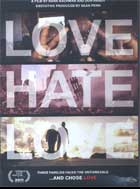
Love Hate Love 2011
Distributed by The Video Project, PO Box 411376, San Francisco, CA 94141-1376; 800-475-2638
Produced by Dana Nachman and Don Hardy
Directed by Dana Nachman and Don Hardy
DVD , color, 83 min.
College - General Adult
Psychology, Sociology, Counseling, Social Work, Grief
Date Entered: 02/21/2014
Reviewed by Rodney Birch, Reference Librarian, George Fox UniversityLove Hate Love is a narrative account on how three victims of trauma have dealt with the loss and moved forward in their lives. Two of the narratives recount the experience of losing loved ones due to violence and terrorism: a son (Peter) lost in the attack on the World Trade Center in 2001, and a sister (Miriam) lost in the London bombing in 2005. The third narrative recounts experience of Tim losing both legs and most of his hearing as a result of the 2002 bombing in Bali. Nachman and Hardy follows the personal journeys of each person as they learn to deal with the loss, search for a way to give back and to turn their tragedy into something positive.
In an interview with Peter’s mom she stated, “It takes a long time to come to terms with all the nevers of death; the numbness of death.” She and her husband have opened a number of mental health clinics in war torn areas of the world to help persons dealing with the stress and trauma of violence, and have invested in the education of a former child soldier in Uganda. Each clinic is opened in honor and memory of Peter, their son. The family of Miriam invested in an Eye Clinic for Children in India, using some grant money to purchase a piece of equipment needed to assess the health of infants’ eyes. Tim counsels amputees on the struggles of losing one’s legs, as well as the rewards and considerations of using prosthetic legs.
Each person defines the struggles they had in coming to terms with the loss, but also discuss the rewards and good they have experienced in giving back to people who have lost or are at risk of losing the good in their lives. Miriam’s sister stated, “What would we have done had we not done this except go further down the spiral.” The intent of each person in the film investing in various causes and services may be summed up by the concluding quote: “It’s hatred that caused all this and love will either conquer hatred or hatred will condemn us” (Jack Grandolas).
The film is a poignant exploration into the grief and sense of loss experienced by persons who have lost someone or something as a result of violence. It also demonstrates the sense of fulfillment and continuation of the life and passion of the loved one by investing in and giving back to other people. This film would be beneficial for sociologists, mental health professionals, and social workers.